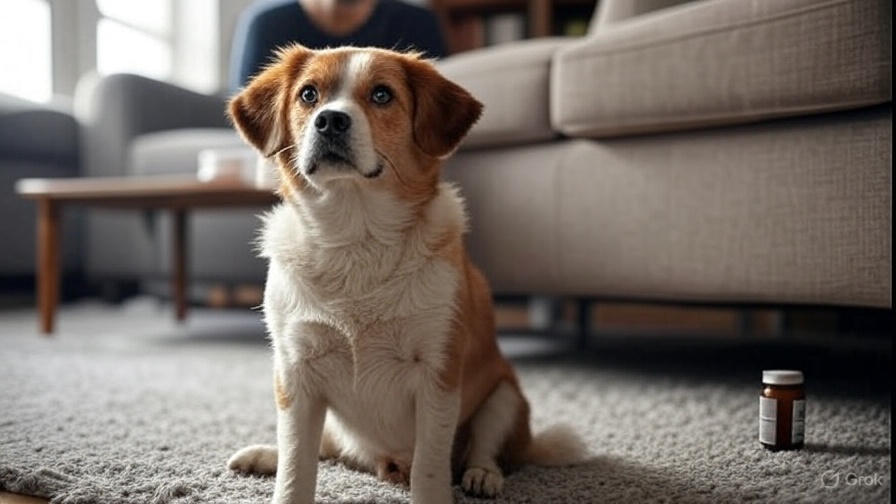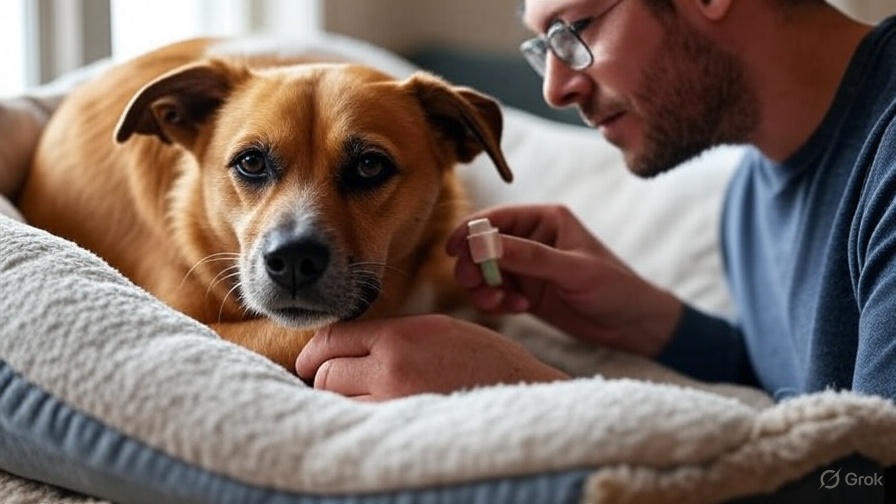How to Treat Dog UTI at Home?
Urinary tract infections in dogs cause significant discomfort and require immediate attention. Many pet owners search for effective home remedies to help their furry companions find relief. This comprehensive guide explores safe, natural methods to support your dog’s recovery from UTI symptoms while emphasizing when veterinary care becomes essential.
Recognizing UTI Symptoms in Dogs
Dogs with urinary tract infections display several telltale signs that alert observant owners to the problem. Frequent urination attempts often produce only small amounts of urine, and your dog may strain visibly during these attempts. The urine may appear cloudy, contain blood, or emit a strong odor that differs from normal.
Behavioral changes accompany physical symptoms. Your dog might whine or show signs of pain when urinating. House-trained dogs may suddenly have accidents indoors, particularly near doors or in areas they previously avoided. Some dogs become restless, pacing frequently or seeming unable to find a comfortable position.
Pain indicators include excessive licking of the genital area, reluctance to walk, or sensitivity when you touch their lower abdomen. Dogs may also drink more water than usual as their body attempts to flush out the infection naturally. Fever occasionally accompanies severe infections, making your dog lethargic and reducing their appetite.
Safe Home Remedies for Dog UTI Relief
Increase Water Consumption
Water serves as the most powerful natural remedy for urinary tract infections. Increased fluid intake helps flush bacteria from the urinary system while diluting the urine concentration. Place multiple water bowls throughout your home to encourage frequent drinking.
Add low-sodium chicken broth to your dog’s water bowl to make it more appealing. The savory flavor motivates dogs to drink more while providing additional nutrients. Ice cubes can also entice dogs to consume more fluids, especially during warmer weather.
Wet food contains higher moisture content than dry kibble, making it an excellent choice during UTI episodes. Mix water directly into dry food to create a gravy-like consistency that boosts hydration levels naturally.
Cranberry Support
Cranberries contain compounds that prevent bacteria from adhering to the urinary tract walls. However, regular cranberry juice contains too much sugar for dogs and can worsen the situation. Unsweetened cranberry juice offers a better option when heavily diluted with water.
Cranberry supplements designed specifically for dogs provide concentrated benefits without harmful additives. These supplements typically come in chewable tablets or powder form that mixes easily with food. Always consult dosage recommendations based on your dog’s weight and follow manufacturer guidelines carefully.
Fresh cranberries can be mashed and mixed into your dog’s food in small quantities. Start with tiny amounts to ensure your dog tolerates the tart flavor and doesn’t experience digestive upset.
Apple Cider Vinegar Treatment
Raw, unfiltered apple cider vinegar creates an acidic environment that discourages bacterial growth. Add one teaspoon of apple cider vinegar to your dog’s water bowl daily for dogs weighing 15-35 pounds. Smaller dogs need only half a teaspoon, while larger dogs can handle up to one tablespoon.
The vinegar must contain the “mother” – the cloudy substance that contains beneficial enzymes and bacteria. This natural component provides the therapeutic properties needed to support urinary health.
Monitor your dog’s reaction when introducing apple cider vinegar. Some dogs may refuse water with vinegar added, requiring you to mix it directly into wet food instead. Never force consumption, as stress can worsen UTI symptoms.
Probiotics for Urinary Health
Beneficial bacteria support overall immune function and help maintain healthy bacterial balance throughout the body. Probiotic supplements designed for dogs contain specific strains that support urinary tract health.
Plain, unsweetened yogurt with live cultures provides natural probiotics that many dogs enjoy. Start with small amounts to prevent digestive upset, gradually increasing to one tablespoon per day for medium-sized dogs.
Fermented foods like kefir also contain beneficial bacteria, though these should be introduced slowly and in small quantities. Always choose products without artificial sweeteners, as these can be toxic to dogs.
Dietary Modifications for UTI Prevention
Protein Quality and Quantity
High-quality protein sources support immune system function while avoiding unnecessary strain on the kidneys. Lean meats like chicken, turkey, and fish provide essential amino acids without excess waste products.
Reduce protein quantity temporarily during active infections to decrease the workload on your dog’s urinary system. This doesn’t mean eliminating protein entirely, but rather focusing on easily digestible sources in appropriate portions.
Avoid protein sources that commonly trigger sensitivities, such as beef or lamb, during recovery periods. These proteins may cause inflammation that complicates UTI treatment.
Grain-Free Options
Some dogs benefit from grain-free diets during UTI episodes, as grains can contribute to inflammation in sensitive individuals. Sweet potatoes, peas, and other vegetables provide carbohydrate energy without potential inflammatory triggers.
Monitor your dog’s response to dietary changes carefully. Some dogs thrive on grain-free diets, while others may develop digestive issues. Make changes gradually over several days to allow proper adjustment.
Alkaline vs. Acidic Foods
Different types of bacteria thrive in different pH environments. Most bacterial UTIs prefer alkaline conditions, making slightly acidic urine beneficial for preventing bacterial growth.
Foods that promote acidic urine include most meats, eggs, and certain vegetables. Avoid foods that alkalinize urine, such as most fruits and vegetables, during active infections.
Environmental and Lifestyle Changes
Frequent Bathroom Breaks
Regular urination opportunities prevent bacteria from multiplying in stagnant urine. Take your dog outside every 2-3 hours during daylight hours, even if they don’t immediately show signs of needing to go.
Morning and evening walks become especially important, as overnight urine retention provides optimal conditions for bacterial growth. Consider installing a dog door if your schedule prevents frequent outdoor access.
Praise your dog enthusiastically for successful outdoor urination to reinforce positive associations with proper elimination habits.
Cleanliness Protocols
Keep your dog’s genital area clean and dry to prevent bacterial accumulation. Gently wipe the area with unscented, pet-safe wipes after outdoor bathroom breaks, especially for female dogs.
Long-haired dogs may require trimming of fur around the genital area to prevent urine from clinging to hair and creating bacterial breeding grounds. Regular grooming appointments help maintain hygiene standards.
Change bedding frequently if your dog experiences accidents, as bacteria can multiply rapidly in damp conditions. Wash all bedding in hot water with pet-safe detergents.
Stress Reduction Techniques
Stress compromises immune system function and can contribute to UTI development. Create calm environments by maintaining consistent routines and providing safe spaces for rest.
Exercise helps reduce stress while promoting healthy urination patterns. However, avoid strenuous activity during active infections, focusing instead on gentle walks and mental stimulation.
Natural calming aids like lavender aromatherapy or calming music can help anxious dogs relax and heal more effectively.

When Home Treatment Isn’t Enough
Warning Signs Requiring Veterinary Care
Certain symptoms indicate serious complications that require immediate professional intervention. Blood in urine, especially if it appears bright red or clotted, suggests severe infection or other serious conditions.
Complete inability to urinate represents a medical emergency requiring immediate veterinary attention. This condition can quickly become life-threatening if left untreated.
Signs of systemic illness, including vomiting, extreme lethargy, loss of appetite, or fever, indicate that the infection may be spreading beyond the urinary tract.
Diagnostic Testing Benefits
Veterinary professionals can perform urine cultures that identify specific bacterial strains causing the infection. This information allows for targeted treatment that addresses the exact pathogen involved.
Imaging studies may reveal underlying structural problems that predispose dogs to recurring infections. Identifying these issues enables appropriate treatment or management strategies.
Blood tests can assess kidney function and overall health status, ensuring that home treatments don’t mask more serious underlying conditions.
Preventing Future UTI Episodes
Long-term Dietary Strategies
Maintaining optimal nutrition supports immune system function and reduces UTI recurrence risk. High-quality diets with appropriate protein levels and balanced nutrients provide the foundation for urinary health.
Regular feeding schedules promote consistent elimination patterns that help prevent bacterial overgrowth. Avoid leaving food out all day, as this can disrupt normal digestive and elimination rhythms.
Consider prescription diets formulated specifically for urinary health if your dog experiences recurring infections. These specialized formulations adjust pH levels and mineral content to discourage bacterial growth.
Regular Health Monitoring
Monthly home examinations can help detect early UTI signs before they become severe. Check your dog’s urine color and odor during regular bathroom breaks, noting any changes from normal patterns.
Weight management plays a crucial role in urinary health, as overweight dogs may have difficulty maintaining proper hygiene and may experience increased infection risk.
Supplement Protocols
Daily probiotics can help maintain healthy bacterial balance and support immune function. Rotate different probiotic strains periodically to ensure comprehensive bacterial diversity.
Vitamin C supplements may provide additional immune support, though dogs produce their own vitamin C naturally. Consult with veterinarians before adding supplements to avoid potential interactions.
Omega-3 fatty acids support overall immune function and may help reduce inflammation throughout the urinary system.
Creating a UTI Recovery Environment
Home Setup Modifications
Ensure easy access to outdoor bathroom areas by keeping pathways clear and doors accessible. Dogs experiencing UTI discomfort may be reluctant to navigate obstacles or wait for door access.
Provide multiple water stations throughout the house to encourage frequent drinking. Elevated bowls may be more comfortable for dogs experiencing abdominal discomfort.
Create quiet resting areas where your dog can recover without household stress or excitement that might interfere with healing.
Monitoring Progress
Keep detailed records of your dog’s urination frequency, urine appearance, and behavioral changes. This information helps track recovery progress and identifies when professional intervention becomes necessary.
Note appetite changes, energy levels, and sleep patterns as additional indicators of recovery or deterioration. Dogs typically show improvement in overall demeanor as UTI symptoms resolve.
Document which home remedies seem most effective for your individual dog, as responses can vary significantly between animals.
Conclusion
Home treatment for dog UTI can provide significant relief when applied consistently and carefully. The key lies in recognizing symptoms early, implementing appropriate natural remedies, and monitoring progress closely. Increased water consumption, dietary modifications, and environmental changes form the foundation of effective home care.
However, responsible pet ownership requires recognizing when professional veterinary care becomes essential. Severe symptoms, lack of improvement within 2-3 days, or signs of systemic illness warrant immediate professional attention.
Prevention strategies prove far more effective than treatment after infections develop. Consistent hygiene practices, appropriate nutrition, stress management, and regular health monitoring help maintain optimal urinary tract health. By combining home care knowledge with professional guidance when needed, you can help your dog maintain comfort and health while building stronger bonds through attentive care.







